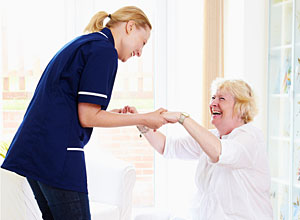Parkinson’s – Information and care in the home

Information on Parkinson’s
Parkinson’s disease is a long-term degenerative disorder which affects the central nervous system, with its symptoms mainly affecting motor skills, i.e. coordination and movement. Later stages of the condition can involve symptoms of dementia, along with emotional and sensory problems.
With its severe impact on mobility, many of those living with Parkinson’s will, at some point, require home care. Everyday tasks such as getting dressed, maintaining personal hygiene and doing housework are made increasingly difficult, and even if you are cared for by family, a professional respite carer can provide them with a much-needed break from their daily care routine.
CAUSES
Research into the precise causes of Parkinson’s is still ongoing. Smoking, historic head injuries and exposure to certain pesticides are all believed to increase someone’s chances of developing Parkinson’s, but the major factor is a gradual loss of dopamine cells in the midbrain. The resulting reduction of dopamine effects those parts of the brain that control movement. Typical symptoms include uncontrollable shaking or tremors, sudden bouts of rigidity and slower movement.
DIAGNOSIS
Diagnosing Parkinson’s can be a drawn-out process, mainly because the earlier symptoms can point to a very wide range of conditions and disorders. In some cases, it can be years before a proper diagnosis of Parkinson’s is established. Parkinson’s typically affects those aged 60 and over, though around 5% of cases are what we call “early onset”, affecting those aged 40 and above. Men are around 50% more likely to develop Parkinson’s, though women are also affected.
TREATMENT
There is no known cure, but treatments to minimise its impact are available. Those in the early stages of the condition are often prescribed L-Dopa, which helps to increase dopamine concentration in the brain. Changes to the diet have also been shown to have a positive effect on those living with Parkinson’s, particularly early on. Surgical procedures, such as applying microelectrodes to stimulate the brain, have proven effective in cases when drug treatments haven’t worked.
Physiotherapy will also play an essential part in the treatment of Parkinson’s, particularly when it comes to advising patients on how to maintain a good standard of health and fitness. Speech and language therapists can help those who find their speech is affected by Parkinson’s, and many of them can also help when eating and swallowing become a challenge.
CARE
The professional care requirements of those living with Parkinson’s will depend on how advanced the condition is, and the domestic circumstances of the care recipient. Early on, they may need help with simple physical tasks, but as their symptoms develop the carer is likely to become more involved with preparing meals and helping them to maintain a routine. Home care provides all of this, while allowing you to retain a greater degree of independence than might be offered in a care home environment.
If you would like to know more about the kind of care services we provide to those living with Parkinson’s, please call us directly on 0170 869 3057, or contact us using our online contact form.


